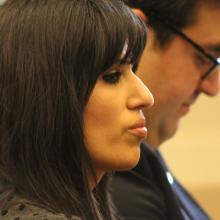domestic violence

Photo via NinaMalyna / Shutterstock.com
Whether you’re intimately involved in this struggle or just getting started, there is a place for you. Rise up and put your faith into action to end violence against women. Here are 7 ways to join the revolution.

Photo via holbox / Shutterstock.com
What do you do when you want to balance the budget and don't know how to compromise? Well, if you're Congress, you raid $1.5 billion from a fund set up specifically for crime victims and hope no one notices.
The Victims of Crime Act fund, set up by Congress in 1984, is distributed to states to support local domestic violence shelters, rape crisis centers, and a variety of victim assistance programs for survivors of trauma and crime. The thing is, this is a self-sufficient federal fund — meaning that it doesn't come from taxpayer money but rather the fines and penalties imposed on criminals and offenders.

Nagmeh Abedini. Image via Adelle M. Banks / RNS
The wife of Saeed Abedini, the Iranian-American pastor imprisoned in Iran since September 2012, has had a difficult month.
First Naghmeh Abedini canceled all public appearances after telling supporters by email that her husband had abused her physically, emotionally, and sexually. Twelve days later, she released a statement saying she regretted her previous emails.
“I was under great psychological and emotional distress,” she said.

Image via arda savasciogullari / Shutterstock.com
A new study shows that states that require a background check before purchasing a handgun experience significantly fewer mass shootings, according to The Huffington Post.
Federal laws require background checks for handgun purchases, but many states skirt the law by allowing purchases to occur online or through private sellers. While the study from the organization Everytown for Gun Safety may seem to state the obvious, the notion that background checks save lives is hugely controversial in the U.S., for some reason.

Image via Stuart Monk / Shutterstock.com
In every moment, we are every age we have ever been, according to psychologist Carl Rogers. For me, this means our bodies are like a bus riding down the highway of life, and the passengers are who we have been at every age. As we travel through life, some things we see, hear, and experience evoke feelings of great joy, love, and calm — or trigger tremendous anxiety, pain, and fear — from different past experiences.
When children are treated like they are not important, told they not smart enough or good enough, valued more for their accomplishments than for the unique individuals they are, treated like they only have value if they have money, or abused emotionally, physically, or sexually, the impact of those feelings never goes away. Those feelings continue to ride on the bus.
Because the child within us never goes away, the impacts of childhood abuse and neglect are long-term unless there is meaningful intervention.

Image via Josef Hanus / Shutterstock.com
It’s hard to stand in front of a congregation and talk about domestic violence.
It’s hard, because you never really know the stories of the people sitting there.
Who might have experienced domestic violence in their lives, in their home growing up, in a relationship during high school, on a college campus, in the home where they now reside?
Who might have experienced it last night? Who might have been told by their mother or religious leader that they cannot leave an abusive marriage because they would be breaking their vows? Who might have struck out at a partner? Who might have let their needs for control overwhelm their sense of self-restraint? Who might want to mask their violence with a smile or generous donations?
It's hard to stand in front of a congregation and talk about domestic violence. But it’s essential.
It’s essential because too often in the past, religious traditions have been used to defend an abusive patriarchy, to bind victims to marriage commitments that are undermined by intimate violence, to encourage people to “offer up” suffering rather than change the conditions that cause it.
It’s essential because shining a light of the reality of domestic violence is a critical step in creating pathways to safety for those who are victims. It’s essential because speaking out about domestic violence as a violation of God’s love can give victims strength to seek a better way. It’s essential because naming domestic violence as evil can help call perpetrators to account – and perhaps to repentance and treatment.
The poetic prayers, songs, and laments of the book of Psalms were recorded to teach worshipers how to praise God, as well as to lament and grieve. When undergoing times of agony or when words are not enough, the Psalms can express the painful emotions for us, as processing emotion helps us to move forward with difficult choices.
Much of the Psalms were attributed to David, including the prayer of Psalm 55—a lament about suffering violence at the hands of a loved one. Many victims of abuse find themselves alone and abandoned by family and friends who become impatient and exasperated by their ongoing struggle with loving their abuser. Praying through a Psalm may be an emotional refuge during such a painful time.

Image via BortN66 / Shutterstock
The story of Job is one of the literary classics in the Bible. It is a story that tries to sort out why bad things happen to good people. It is a story that tries to make sense out of suffering. It is a story that concludes with an epic confrontation between Job and God. And it is a story that captures the isolation, the misunderstanding, and the feelings of abandonment.
Job’s friends and his wife are convinced that it is Job’s sin that has led to his misfortunes. That has a familiar ring to people trapped in violent and abusive relationships. “Why did you make him mad?” friends ask. “Why don’t you just leave?”
And inside the relationship, the abuser often threatens even greater harm if the victim tells anyone about what is happening. And if the victim decides to leave, the risk of violence increases, often with lethal consequences.
As Job said of God, “If I go forward, he is not there; or backward, I cannot perceive him; on the left he hides, and I cannot behold him; I turn to the right, but I cannot see him…If only I could vanish in darkness and thick darkness would cover my face!” (Job 23:8-9, 17)
Victims of domestic violence – both women and men as well as children – often feel isolated, abandoned by family and friends who are uncomfortable or afraid of the topic, trapped by religious traditions that stress male dominance and the indissolubility of marriage and feel forgotten by God. Job knew that feeling.

Image via Jan Faukner / Shutterstock
“What do I do, Dr. Samples? I love him. I want to forgive him,” she said. “Doesn’t Jesus teach us to forgive? I want to give our life a chance, but I’m scared. What is the right thing to do?”
As a clinician who has worked with victims and perpetrators of domestic violence since my undergraduate training, I know something about the journey of healing she is facing. I know that protective anger is often required for the courage to leave an abusive relationship. Where inter-partner violence occurs, many relationships separate and reunite many times before the final dissolution, and the majority of those relationships become more violent with time.
In relationships where one partner is victimized by another, the most dangerous period of time is when the victim is ending the relationship. Many individuals are injured, permanently disabled, or even killed when they move to dissolve the relationship.
Forgiveness is healing to the soul of the forgiver as well as the forgiven. In addition to the spiritual benefits, those who live a life of forgiveness have better mental and physical health outcomes. Achieving forgiveness of the abuse is often the pathway for a survivor to rebuild new, healthy relationships with others. However, in the case of relationship violence, premature forgiveness of the abuse through reconciliation can place the abused partner (as well as children, family members and coworkers) at greater risk of future harm.

Image via Michal Plachy / Shutterstock
Intimate partner violence is a pervasive problem in our society. Moreover, while intimate partner violence affects men in addition to women, it disproportionally victimizes women. According to the Centers for Disease Control and Prevention, as many as 47.1% of women experience at least one act of psychological aggression in their lifetime. This aggression can turn physically violent: 31.5% of women experience physical violence in their lifetime, while 22.3% of women are victimized at least once by a severe act of violence. Intimate partners also perpetrate sexual violence. About 8.8% of women are raped and another 15.8% are sexually victimized by a partner in their lifetime. Finally, 9.2% of women are stalked by a partner to the point of fearing for their physical safety.
Given this reality, it is important to recognize that at any given time members of our congregations are suffering various forms of abuse. Such experiences of violence and abuse, past and present, are part of the background that inform the messages that individuals take away from Christian discussions of relationships and marriage — including reflections and sermons on Ephesians 5.

Image via Oleg Golovnev / Shutterstock
There are many reasons for divorces and one of them is domestic violence. It’s true that there are women and men who experience domestic violence and never leave the marriage; they only want to cleave while others leave for their dear life. Domestic violence can be viewed as family violence but there are family members from whom we may rarely hear in these situations, namely children. Most certainly, domestic violence impacts the perpetrator and victim yet if there are children in the same space, they, too, will be affected. They, too, may even be beaten, battered, and bruised. This is the blues-inflected struggle of life.
The book of Mark focuses a lot on the suffering of Jesus. Pain seems to have some privilege in the way Mark preaches the gospel. He keeps it real. Mark is a truth-teller because even today many travel a trail of tears. The level of pain and the type of pain vary. But the honest truth is that life is not a bouquet of sweet-smelling roses. There are thorns and fractures. There is brokenness — broken bodies and relationships — so it is of no surprise per se when we see Jesus and the Pharisees engage in a conversation about marriage and divorce, topics that may heighten our awareness of human brokenness in our society. It’s no secret that many marriages fail and end in divorce, whether they are people of faith or not.

Photo via Francis Wong Chee Yen / Shutterstock.com
When I first read about the rape of Tamar, I was astonished. This tragic story of a beautiful princess — sexually violated by her half-brother and then betrayed by her powerful father — left me aghast. What could I do with this troubling tale, tucked among pages of scripture where I sought spiritual guidance?
Throughout my life in the church, I had never heard the name “Tamar.” No reference to this daughter of King David. No remembrance of her profound suffering and grief.
It’s not an easy story to hear, especially within the biblical narrative of God’s love and providential care for God’s people. It’s like a well-guarded family secret no one dares mention, as if it might swell into a crushing typhoon, leaving devastation in its wake. Following tradition, I hoped not to encounter Tamar’s story again.
If shunning the ancient biblical story of Tamar is all too easy, avoiding news of unrelenting violence against women is becoming harder.

Image via victorass / Shutterstock
When it comes to the facts surrounding domestic violence (or intimate partner violence), the challenge presented in the fourth chapter of 2 Timothy remains as relevant today as it was more than 2000 years ago. In the U.S., “abundant life” competes regularly with the false prophets of violence. The terrifying rate at which women are dying at the hands of their intimate partners intersects with an entrenched American gun culture that has sold believers on the idea that more guns means more safety. In reality, women in the U.S. are 11 times more likely to be murdered with a gun than women in other high-income countries.
Over the course of October, or Domestic Violence Awareness Month, an average of five women per day—155 total—will be killed with guns. Intimate partners will comprise the majority of their killers, and too many who embrace death over life will come from Christian congregations.
The recent shooting in Oregon marks the 294th mass shooting in 2015 alone, a terrifying number in its own right and a reminder of just how far America has enmired itself in the consequences of its gun culture. More than half of all mass shootings also include the death of an intimate partner and family member.
Judges 19 is a story of intimate betrayal and the complicity of a larger community calling us to consider our own roles in our communities...The sheer horror of what this woman endured—including at the hands of husband and host—extinguishes the fires of my sanctified imagination. I can only conjure her screams. And I have no words to express them. One might look to God for a final word, but God is absent from the chapter, as this chapter and any mention of domestic violence is absent from too many pulpits.
Bruised and battered in body and spirit, many victims of domestic violence are looking to faith communities for guidance. We must do more to make sure our congregations are safe spaces for survivors of abuse. And that starts with naming the sin of domestic violence in our churches and examining how our own sacred texts have been misinterpreted to condone such abuse.
This October—as part of Domestic Violence Awareness Month—we’re featuring a new online series called Troubling Texts: Domestic Violence in the Bible. With thought-provoking commentary from experts, pastors, and emerging scholars, we'll take a hard look at how scripture has been used to justify domestic violence.
I was six by the time my new daddy showed up. He was quiet yet strong and kind. I could tell by the way he always spoke to mama, his voice tempered, the way he looked at her. For the nearly 40 years that they were together until my mother passed away, I can’t recall a time I ever saw my stepfather raise his voice to her, let alone hurt her. In fact, I don’t know too many men that would accept an abused woman with five small children and raise them as his own. He cherished my mother, in ways that I suspect my biological father, tried so desperately to do.
They were two men. Each woven in his own love and laud for my mother. One cloaked in his pain; the other in his kindness and kinship. But despite their differences, they were both my father, and we still have an equal and equitable obligation to dignify them the same.
That is why when I founded Saving Promise—a national domestic violence prevention organization inspired by my daughter’s little girl named Promise—there were three things that I was clear about: 1) we must focus on greater public awareness and prevention; 2) we must mobilize the community to take action; and 3) we must engage and invite men to be a part of this movement. Men who need help and men that want to help.
This month marks Women’s History Month, a time when we lift up and honor women around the world, especially those whose journeys have paved the way for the next generation. Through my journey of building Saving Promise there is one thing that I have come to understand: if we continue to address intimate partner violence as a women’s issue and not invite men to be a part of this dialogue, we will no sooner prevent this global public health crisis. Therefore, I personally believe we must reflect not only on the paths that we’ve paved for women, but those that we carry in the deepest corners of our hearts—our communities, our families, our children, and our men.
Paul teaches a bedrock unity in marriage. Both the Christian wife and husband are members of the Church which is Christ’s body (v30) and have further cemented this with particular devotion to union with each other (v31). Since we have this fundamental unity, a divisive gender identity in marriage or elsewhere is impossible to accept—it sets up barriers where Christ recognizes none.
As such, men inside or outside of marriage must follow Christ’s example in giving of themselves for others, particularly to those who rely and trust on them. This is why domestic violence is such a satanic perversion of masculinity: it replaces a protective, self-sacrificial love with a violent, domineering authority. A relationship which should point to Christ and the Church instead becomes controlled by power and violence.
Paul forces me to think differently about what it means to be a man. I need to reorient my actions in a way that recognizes that Christians, male and female, are all part of one body of Christ. That should push men, especially those in positions of authority, to a love that seeks to build up and to serve rather than domineer. That love, rather than a macho authority, is the true mark of a man.
After the high-profile domestic violence cases of Ray Rice and Adrian Peterson, the NFL is speaking out with a new Super Bowl Ad. The commercial features a woman pretending to order a pizza in a call to a 911 operator as the camera rolls over shots of a disheveled home. The operator eventually comes to understand that the woman is trying to ask for help without alerting her abuser.
The NFL created the ad in partnership with No More, an umbrella organization that connects groups working to end domestic violence and sexual assault.
Did God lift Seahawks quarterback Russell Wilson’s overtime pass into the end zone on Sunday, rewarding the prayerful Christian player with a championship victory and a trip to the Super Bowl?
Millions of Americans may think so.
“One in four Americans believe there will be a 12th man on the field, and that the hand of God will be seen before the final whistle blows in the Super Bowl,” said Robert Jones, CEO of Public Religion Research Institute.
And 53 percent agree God “rewards athletes who have faith with good health and success,” according to a new PRRI/RNS Religion News Survey released Jan. 22.
Indeed, not only did majorities of all but one major religious group put faith in God regarding the faithful, so did 27 percent of the those who claim no religion, the “nones.”







